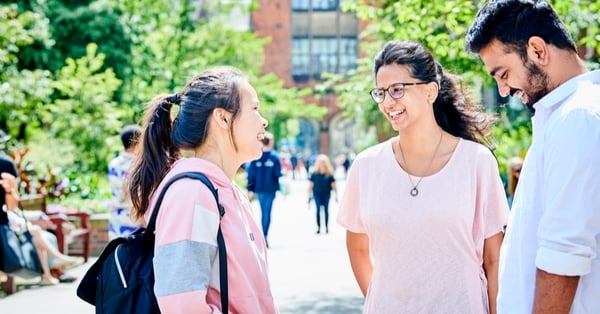The UK’s education system is one of the best in the world and that’s why it attracts over 18,000 Indian students a year. A university always wants high-quality students to graduate but we know that travel expenses, tuition fees and living costs all add up.

Students who want to pursue a full-time study program and increase their employability can take advantage of financial aid opportunities like scholarships. This makes studying abroad easier to finance.
If you want to come and study at Newcastle University, there are several scholarships available for Indian students, both private and provided by us.
- Vice-Chancellor’s International Scholarships
- Vice Chancellor’s Excellence Scholarships
- Private Scholarships
- Tips for getting a scholarship
Vice-Chancellor’s International Scholarships
The Vice-Chancellor’s International Scholarships are tuition fee discounts with a value of £1,500 - £5,000. The scholarship offer will depend on predicted or achieved grades.
You’ll automatically be considered for this scholarship if you’re from India as part of your academic course application. There’s no application form to complete. If successful, you’ll receive the scholarship for the full duration of your degree programme.
Eligibility criteria
To be considered for this scholarship, you must:
- be a national of India
- have been offered a place to study on an eligible undergraduate course at Newcastle University
- be assessed as international for fee reasons
Vice Chancellor’s Excellence Scholarships
You can apply for this scholarship if you’re a student from India and it covers 50% or 100% of the tuition fees.
Eligibility criteria for 50% tuition fees
To be considered for the 50% scholarship, you must:
- be a national of India
- have been offered a place to study on an eligible undergraduate course at Newcastle University
- be assessed as international for fee reasons
- have or receive a minimum of ABB grade at A-Level - or your country’s equivalent
Eligibility criteria for 100% tuition fees
To be considered for the 100% scholarship, you must:
- be a national of India
- be assessed as international for fee reasons
- need to have also been offered a place on an eligible course
- already have or you’re expected to receive a minimum of ABB at A Level - or whatever the equivalent is in your country
There are deadlines for this scholarship. Find more up-to-date information about the Vice-Chancellor’s Excellence Scholarships here. It includes the application closing dates, how you can apply and more.
“The scholarship has enabled me to study in the UK thus opening the doors to a global career ahead.“ - Manpreet, a Synthetic Biology graduate from India.
Universities can be expensive but don’t let lack of funds stop you. Applying for a scholarship can assist you. The hard work you put in during this exciting stage of your life will help you gain a degree that will get you your ideal job.
Private Scholarships
It’s not just universities who might award scholarships. Some private sponsors and donors might be willing to offer you one.
For instance, Commonwealth Scholarships is an international programme governed by 53 countries in the Commonwealth. They usually award around 900 scholarships to students coming from developing Commonwealth countries who want to study in the UK.
Usually, this bursary takes care of tuition fees, a monthly allowance and even airline tickets from home to the UK and back.
Chevening Scholarships are the UK government’s global postgraduate scholarship programme. It’s a fully-funded scholarship to help you undertake any master's course at any accredited UK university.
Tips for getting a scholarship
If you’re unsure about securing a scholarship, here are some tips and helpful advice.
- Apply if you’re eligible: Even if it’s just a small grant towards the cost of some of your textbooks, it’s worth taking the time to apply. It’s one less thing to worry about when you get there.
- Be confident: If the application requires a letter or essay explaining why you deserve the scholarship, make sure you tell them why. List all your relevant achievements, academic results but also community work, career experience and awards.
- Never pay an application fee for a scholarship. There is no such thing as a ‘guaranteed scholarship’.
- Keep all your documents: You need proof of funds to get your visa and that includes evidence of any scholarships you have been awarded.
- Think about your finances 18 months before your course: You need to think about your finances early on. Once you have been accepted onto the course, you may only have a short window of time where you can apply for a course-specific scholarship. So don’t miss your deadline and keep in contact with the University’s international office.
- Have a backup plan: Don’t worry if you don’t get a scholarship. There are other ways to finance your education.
Scholarships can help you finance study abroad but you also need to make sure you have enough money to live, eat and spend time with friends whilst studying.
Calculate the cost of university with our helpful tool
If you’re a student from India looking to study in the UK, there’s a lot of planning that needs to be done. To figure out a more accurate university cost, use our helpful calculator. You’ll be able to compare your income with your expenditure and establish an accurate budget for your time at university.
Adjust the figures and experiment to create a realistic budget for yourself.
